Copyright ©2010
PopEntertainment.com. All rights reserved.
Posted:
August 20, 2010.
Alicia Witt has
been steadily holding on to her day job – that of an extremely
successful working actor – until she can make real her dream job:
that of singer-songwriter. That goal is becoming ever more realized now that she
has debuted her self-titled EP and its well-received first single,
“Anyway.”
“Making my own
music has been a dream of mine for my entire life,” she confesses to me
from her home in LA. “Three years ago, I finally just started doing it.
All of the sudden, there were all these songs, and the more I write, the
more come out. I can’t compare this time to any other time in my life
because I feel that there was something missing in all the years before
that.”
This new
completeness – this wholeness – can be considered closure on all those
“missing” years, which she attempted to fulfill with gigs on television
and in movies.
In fact, you’ll
recognize this redheaded stunner from any number of obscure little
projects, such as The Sopranos, Friday Night Lights, Law and Order,
Cybill, Ally McBeal, Twin Peaks, and even That’s Incredible.
You may have also seen her in films like Dune, Four Rooms and
Mr. Holland’s Opus.
However, like a
good deal of art, the joy of creativity had sprung from the depths of
pain and heartache.
“[The single]
‘Anyway,’ came about at the end of a really toxic relationship,” she
says. “I started writing the song when things were really bad, with the
understanding that the relationship was over. Still, I was trying to
figure out why it had ended and why it had happened in the first place;
how I could get myself into a place in my life where I was okay with
being in a situation like that. And as I was writing the song, I was
like, ‘I don’t really care anymore. It doesn’t matter. It’s over. There
is no point in figuring out why or how.’”
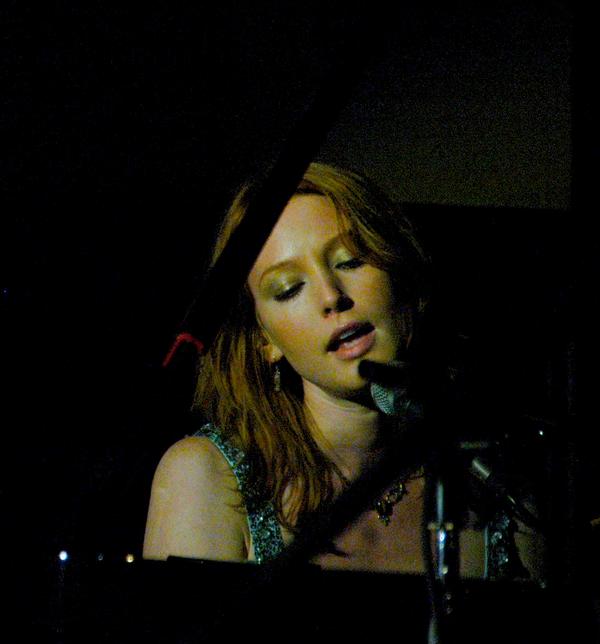 The how and the
why may not matter, but to Witt, the truth always does.
The how and the
why may not matter, but to Witt, the truth always does.
“There is not
anything in the song that isn’t true,” she says. “In writing my own
songs, even if I feel that it’s not something specific that happened to
me, which this one is, I always want the words to be true. I’ll never
put a lyric in because it rhymes or it fits. I would rather spend a
really long time agonizing over the right lyrics so that it works with
the music but also means what I wanted it to mean.”
The subject of the
song, who shall remain nameless, is long gone, but the memories linger
on (and some of them not so bad).
“We’re not in
touch anymore,” she says of her former love. “I guess if he heard it, he
would recognize the scenario. But some really great things can come out
of breakups. I’m really grateful for the relationship for many reasons.
I think everything happens for a reason. It’s so cool to be able to turn
something like that into a song.”
Witt’s distinctive
take on her newfound creative path reflects other aspects of her unique
life, including her unusual career, education and even her taste in
music.
“When I was
growing up, I was kind of weird musically,” she says. “I loved the big
band era more than anything. It was almost like I was born in 1941. I
know all of those lyrics and singers. And I love Nat King Cole and
songwriters like George Gershwin and Cole Porter. There was actually a
radio station back home that I was a little obsessed with, [big-band
format] WNEB. I
listened to that station morning, noon and night.
“My mom listened
to a lot of the sixties-style stuff, like the early Beatles. It wasn’t
until I was much older, a teenager, that I started appreciating The
Beatles and The Rolling Stones. There were some current pop songs that I
loved, like ‘Total Eclipse of the Heart.’ For the most part, I was
listening to big band music. I also loved piano-driven
singer-songwriters like Elton John and Billy Joel and even Barry Manilow. I do think he’s a great songwriter.”
Before her
eventual move to LA as a teenager, Witt was home-schooled in Worcester,
Massachusetts by her parents, both of whom were teachers. Fun fact: her
mom was once listed in The Guinness Book of World Records as
having the longest hair in the world, at twelve feet (and she wore it in
an updo).
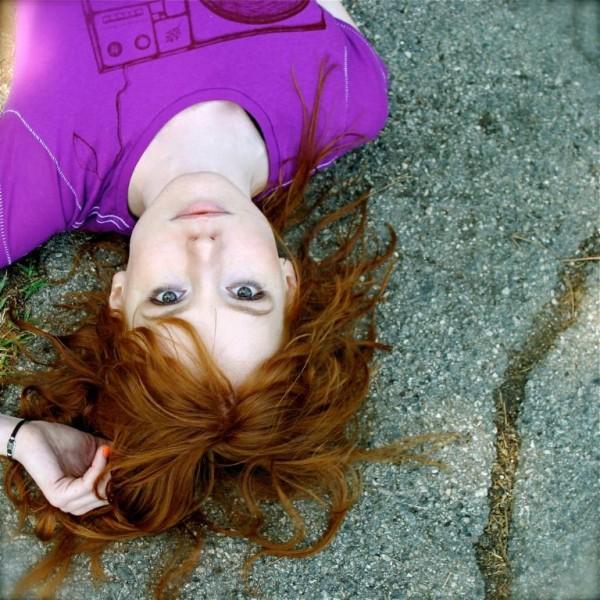 “Home schooling
was definitely better in some ways,” she says, “because my parents’
philosophy was that they wanted their kids to explore whatever they were
most interested in at any given time. I studied classical piano very
seriously. I didn’t have any particular curriculum to stick to. It
wasn’t a regimented kind of education where we studied history and math
and geography every day. It was more like I would find a chapter in a
history book that interested me and I would read that for a week. We
didn’t have tests. It was really unconventional, and I did know that. At
that time, home schooling was not done nearly as much as it is today.”
“Home schooling
was definitely better in some ways,” she says, “because my parents’
philosophy was that they wanted their kids to explore whatever they were
most interested in at any given time. I studied classical piano very
seriously. I didn’t have any particular curriculum to stick to. It
wasn’t a regimented kind of education where we studied history and math
and geography every day. It was more like I would find a chapter in a
history book that interested me and I would read that for a week. We
didn’t have tests. It was really unconventional, and I did know that. At
that time, home schooling was not done nearly as much as it is today.”
Her TV debut, at
age five, was on the ABC series That’s Incredible, where she –
incredibly – recited Shakespeare. The nation responded by exclaiming,
“That’s incredible!”
“It was my first
time in front of an audience,” she recalls. “I can still remember the
feeling I had the moment the audience responded to something that I had
done. I was sort of astounded. I was doing a scene from Romeo and
Juliet, with the host, John Davidson, as Romeo. He had his little
pocket Shakespeare book that he was reading from. I remember that he
had a long-stemmed rose that he was going to give me as part of the
reading. At one point, he went to give me the rose, and he asked me if
Romeo gave Juliet a rose and I said no, it wasn’t in the play. And so he
tossed it over his shoulder.”
Among those
watching this broadcast were film director David Lynch’s people, who
were having a heck of a time casting a certain child character for his
upcoming Dune movie adaption.
She says, “They
had difficulty casting the role of a five-year-old who could speak in an
incredibly adept way. [The character’s] mother had drunk this magic
potion, the Water of Life. It gave the daughter all of this knowledge
that she wasn’t supposed to have. The casting director thought that
because I could read Shakespeare, I must be able to do this. I went to
New York for the casting. It was like a dream. It was the first time
that I realized that acting was a viable career option. I always loved
acting, but I didn’t know that it was a possibility. I knew from that
point on that I wanted to do that for the rest of my life. Before that,
I thought I was going to be a painter and have a farm and run a
restaurant and be a governess.”
She worked with
Lynch again in Twin Peaks, his enormously successful foray into
weekly television. The series baffled and confounded the country, but
hooked millions of obsessed fans.
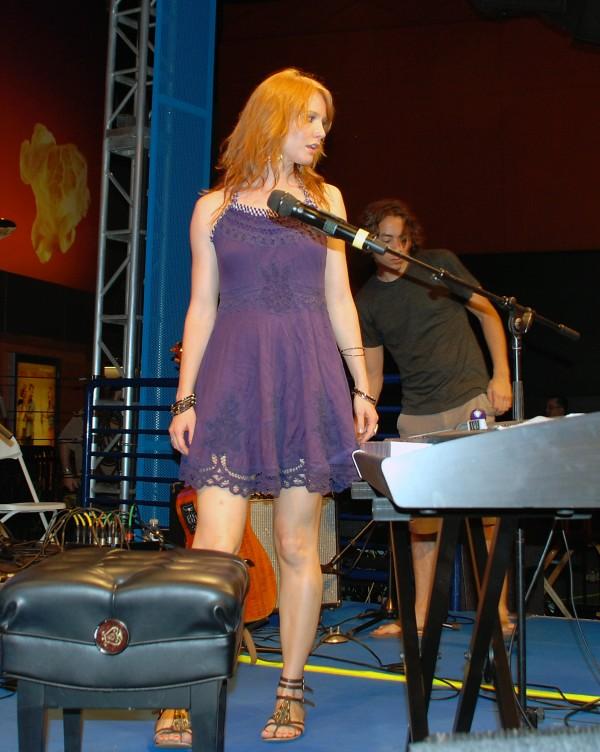 “David had
actually written a part for me because we worked together on Dune,”
Witt says. “My mother had gotten in touch with him when we moved to LA.
At that time, I was basically trying to get an agent. I wasn’t a child
actor. I just did that one film at age seven. [My character on Twin
Peaks] played the piano; I’m still not exactly sure why she was
dressed in a princess outfit and wearing a tiara. I didn’t really watch
TV much, but I was excited to get the work with David.”
“David had
actually written a part for me because we worked together on Dune,”
Witt says. “My mother had gotten in touch with him when we moved to LA.
At that time, I was basically trying to get an agent. I wasn’t a child
actor. I just did that one film at age seven. [My character on Twin
Peaks] played the piano; I’m still not exactly sure why she was
dressed in a princess outfit and wearing a tiara. I didn’t really watch
TV much, but I was excited to get the work with David.”
Despite her lack
of attention to television, she had spent a lot time on it if not in
front of it. By the mid-nineties, she had landed a regular role on the
Cybill Shepherd sitcom, Cybill, playing the star’s quirky,
cynical daughter.
“That was the
first job I had that allowed me to quit my day job as a pianist at the
Beverly Wilshire Hotel,” Witt says. “It was a very, very, very big deal
for me. I will always remember the day I got the part. I had gone
through all these auditions and then there was a network test. There
were
all these people in suits sitting around staring at me. I had gone in
and done my scenes the same way I had done them in the past five
auditions. It was the final round, so basically I was either going to
get it or not get it. I walked out of there thinking, ‘well, I did my
best.’ About thirty seconds later, I was walking to my car and I heard a
voice behind me call my name and it was Cybill. She was walking toward
me with a few of the producers behind her and she said,
‘Congratulations, honey, you’ve got it! I just wanted to tell you!’ I
screamed so loud. I called all my friends!”
The highly
regarded series was also a chance for her to display her musical chops
(while playing “Chopsticks!”).
She recalls,
“There was a piano on the set, and I don’t think it ever came up in
meetings that I played the piano. When we were doing rehearsals for the
pilot, they figured I might as well be playing the piano, because it was
there. They worked out a little skit where I started out playing this
complicated Mendelssohn piece, and then Cybill walks in and I started
playing ‘Chopsticks.’”
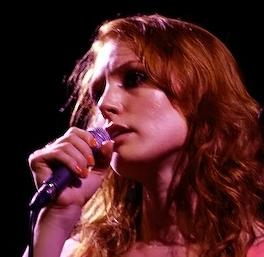 There were
exceptions to her little-or-no-TV rule; for instance, she was already a
fan of the heavily-music-packed comedy-drama Ally McBeal before she was
cast in the show.
There were
exceptions to her little-or-no-TV rule; for instance, she was already a
fan of the heavily-music-packed comedy-drama Ally McBeal before she was
cast in the show.
“I was really
excited to be on it and that came about because I was a huge Ally
McBeal fan,” she says. “It was one of the only times that I
genuinely felt star struck. There have only been a few shows in my life
that I have watched religiously. I’m much more into watching movies than
I am television. I wanted to make sure I was home every Monday night to
watch it. I was obsessed with it.”
She also became
hooked after the fact, like when she became a Sopranos fan after
she landed the role as a film exec who “helps” Christopher (Michael
Imperioli) with his screenplay.
“I didn’t watch
The Sopranos until I was on it,” she says, “I went back and watched
it and became addicted. The experience was great. I felt like I was
making a movie. There was a great crew and there was plenty of time to
do as many takes as we needed. It was a very different process [than
what I was used to with previous shows]. I realized that TV was changing
a lot. It felt like shooting scenes in a movie. The lighting was
beautiful and the acting was realistic and the writing was among the
best I’ve ever read. I loved Michael Imperioli so much. He is really,
really magical to work with.”
Movies figured
into her career as well. She was part of a number of successful films
post-Dune, including the classic Mr. Holland’s Opus, about
the life and career of a high-school music teacher, starring Richard
Dreyfuss.
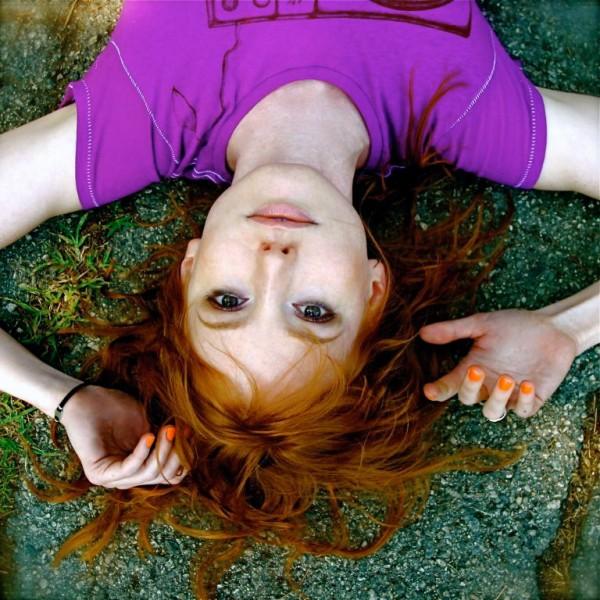 She says, “I had a
special connection to that film because it was not just about music, but
it was about teachers. There was so much in it that my dad had gone
through, even though my dad wasn’t a music teacher; he was a science
teacher. To me, it was more about teachers than it was about music,
specifically. I was just excited to get to work with Richard Dreyfuss,
who I think is a great actor. He was really nurturing to me but he never
talked down. He really encouraged me and made me feel very welcome.
After he was nominated for an Oscar for that role, he took everyone in
the cast and crew out to dinner. He reserved a restaurant for the whole
bunch of us. He made a speech thanking us, saying that he would not have
been nominated without us.”
She says, “I had a
special connection to that film because it was not just about music, but
it was about teachers. There was so much in it that my dad had gone
through, even though my dad wasn’t a music teacher; he was a science
teacher. To me, it was more about teachers than it was about music,
specifically. I was just excited to get to work with Richard Dreyfuss,
who I think is a great actor. He was really nurturing to me but he never
talked down. He really encouraged me and made me feel very welcome.
After he was nominated for an Oscar for that role, he took everyone in
the cast and crew out to dinner. He reserved a restaurant for the whole
bunch of us. He made a speech thanking us, saying that he would not have
been nominated without us.”
Witt’s current TV
project is Friday Night Lights, the acclaimed series that will
air its final season this year. Here, she continues her streak of
playing unusual characters in high-quality
shows.
“I play basically
white trash, which is really fun,” she says. “My
character had a kid when she was
in high school. She’s now in her thirties and she has a fifteen-year-old
daughter. She is not the most responsible mother in the world, to say
the least. She really tries her best but she makes some really messed-up
judgment calls. She doesn’t think anything of having random guys come
out of her bedroom early in the morning when her daughter is getting
ready for school. She dresses way age-inappropriate. She has a really
good heart, but she makes some questionable decisions. I completely
loved playing her.
“I could not be
prouder to be a part of [Friday Night Lights]. I’ve never worked
on anything like it before. They have three cameras shooting at once.
There is not really any blocking or rehearsal. There is an energy of
complete realism about it that I don’t think it can be compared to
anything, not even the more realistic type of film. It’s not even
documentary style; it’s like these cameras are just placed around,
capturing moments in people’s lives. As an actor, you don’t even know
where the camera is going to be because it moves around from take to
take. You almost feel like there are no cameras. It’s completely
brilliant. And there is so much improvising that happens. I mean,
obviously there are unbelievable scripts that we work from but half the
time the directors say, okay, just ignore the words and say whatever you
want. I can’t stress enough how incredible the lack of continuity is.
It’s so free. I think it really shows up in the work. You don’t feel
like you’re watching actors.”
However, we will
continue to watch Witt as she takes us down more fascinating,
unpredictable roads, involving both her music and acting.
“I can’t believe
it, not even today,” she says as she looks back at her acting career and
looks forward to her singing career. “It’s such an incredible blessing.
It’s a privilege to be able to do what I love for a living. I never,
ever take that for granted or stop being amazed by it.”
Features Return to the features page